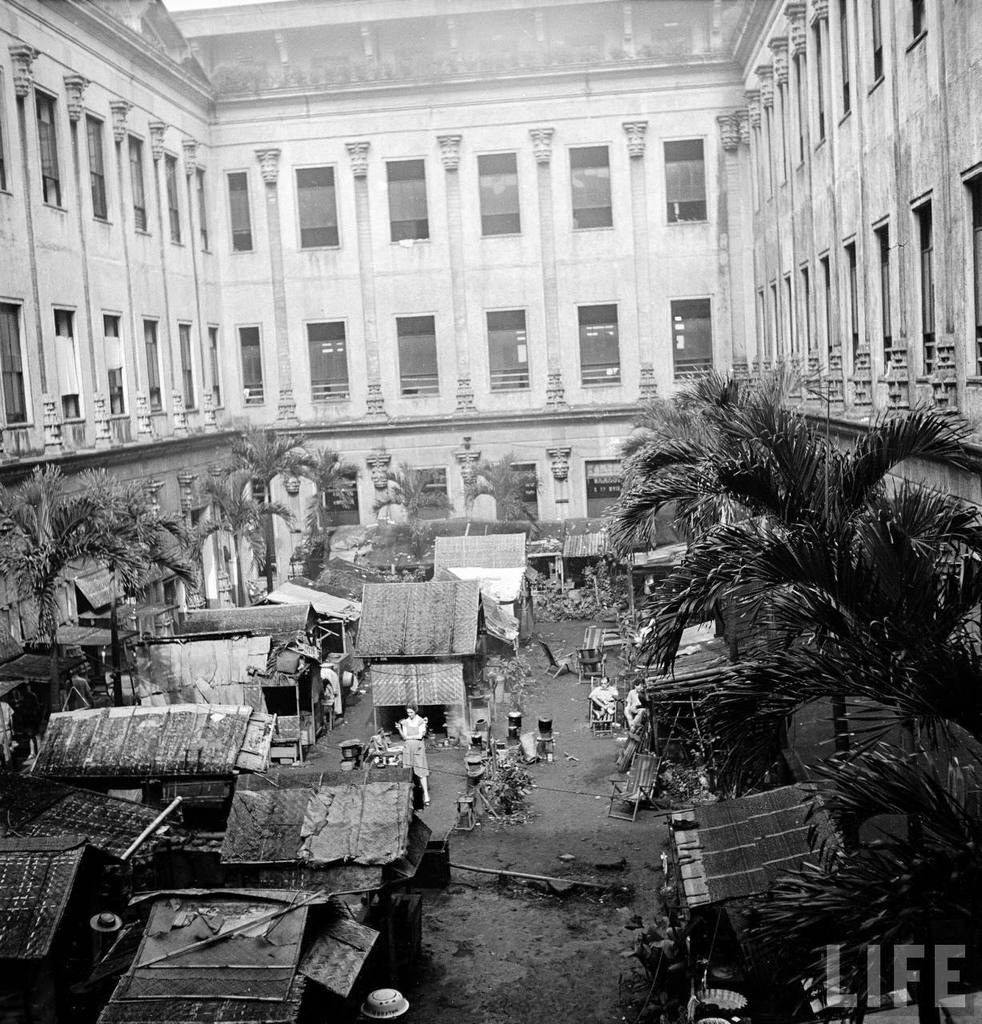Trainloads of boxed goods going to the end of the sugar cane track line and thence across gulleys and mountains
to our evacuation camp. A cable has been run from end of railroad line to bodega, within 9 kilometers of the camp. Goods will be stored in bodega and carried to camp by Negritoes who sling ropes around hundred-pound boxes and trot up the mountain slopes as though the boxes contained feathers instead of canned goods. Today the “extras” went. Many boxes to remain in the bodega until the end of the War, or until the Islands are again in American hands. Carved camphor wood chests containing the beautifully hand-embroidered table linens we get here, banquet cloths with so much drawn work that the remaining cloth seems too delicate to launder, And pina luncheon sets (pineapple fiber woven under water, the most delicate, most expensive, and also the most desirable fabric of the Islands) embroidered by little orphan girls in the convents of Manila, where they sit looking through magnifying glasses to do the drawn work (threads are so fine and the demands of the work so accurate) under the supervision of European nuns. These linens, perhaps irreplaceable after the war, sterling silver, bronze work, crystal decanters, Kensington mint julep glasses which frost so deliciously—all these things one has and can do without, but would hate to see the Japs get them or have them looted from our homes when we evacuate. The Central has provided all families with boxes of uniform size (20” x 14” x 14”) with handles of rope on the ends, for canned goods. These will be carried in on poles slung through the rope handles, probably several boxes on a pole with a Negrito on each end. Each box should hold one or two weeks’ supply of groceries, depending upon the quantity and variety of fresh vegetables and meat which may be secured in our mountain retreat. Typical box from my list #4:
2 cans prunes
12 Carnation milk (tall)
2 natural milk (large)
1 toilet paper
4 Lifebuoy soap
1 toothpaste
6 Fels-naptha
1 puffed wheat
2 oatmeal (small)
1 borax
1 tea
1 peanut butter
2 cans beans
2 cans succotash
1 peach preserves
2 deviled ham
2 corned beef
1 large tin soda crackers
6 chicken soup
1 can butter (small)
1 can mince meat
Box macaroni
6 Nestle’s cream (small)
2 peaches
6 tomato juice (large)
6 vegetable soup
box salt
6 chicken gumbo soup
I have 20 boxes filled like this, with a list of contents of each. Some have Crisco, some coffee, some baking powder, and one has my last sack of flour. Some have tinned Jacob’s biscuits (a Scotchman with London wife buys for the Central commissary, which accounts for the stock of Jacob’s crackers to Americans—but biscuits to the British), a variety of fruits, soups, vegetables, and canned meats. But milk (Klim, Lactogen, condensed, powdered, evaporated, natural, all kinds), toilet soap, and laundry soap are in all. Then there are jams and jellies to put on crackers for the children, because crackers are beginning to have a stale taste and canned butter tastes more like cheese than butter. Strawberry preserves help kill the butter taste and do not interfere with the food value of the butter. The commissary will move with us so additional canned goods can be bought—though the desirable foods have long since been exhausted. Milk, tomato juice, coffee, tea, soap—these cannot be had at any price.
Reports from men who are supervising construction of our nipa houses are that chickens can be bought (by sign language) from Negritoes in the mountains $.25 each, and eggs, corn, spinach (the local version), small tomatoes, dried fish are brought in. There are deer in the hills and in snipe season there should be more than we can eat. All the cold stores have snipe killed by hunters who find the bird more plentiful than they find shot for killing it.
The 20 boxes are packed and marked, with name, number, and contents listed in a book. A kerosene lamp, buckets for bringing water from the river, pads for cots (supplied by the Central), iron cooking utensils to use over open fire, mosquito nets, blankets, bolos for cutting wood—these things are ready to go.
But the feminine will out. Today Dr. Jardelega came by to see the baby, whose stomach was upset (probably due to eating long beans from acacia trees, like locust trees in the States), and I asked him to remove a small mole developing on my chin. He asked by bother with such a little thing as this and I told him that I wanted myhusband to think me beautiful as well as efficient when he came home. So he applied nitric acid and said he would return on Monday for a second application.
Had first official communication from army yesterday, from Maj. Richard I. Jones, Infantry, saying his office in Bacolod had confirmed my husband’s enlistment in the army, with rank of 2nd Lt. QMC Reserves, and that he was now stationed on Luzon.
